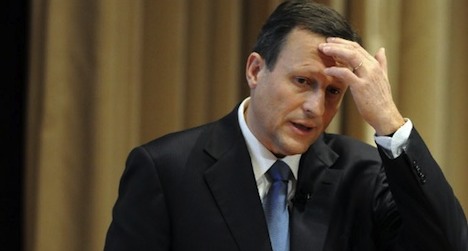The golden handshake was to have totalled 72 million francs ($77 million), but the size of the payout caused uproar in Switzerland.
Now the former chairman Daniel Vasella will receive 2.7 million Swiss francs in cash, and shares worth about 2.2 million francs, for services during the transition period since he left in February this year.
The total amount is about one fifteenth of what he would have received.
However, he is to continue acting as a consultant for the firm at a high daily fee.
When details of the initial bonanza deal leaked out there was an outcry in Switzerland.
Vasella announced that he would forgo the sum, but he became the unwilling poster boy for campaigners behind a popular vote in Switzerland to rein in executive pay.
The former chairman who took home a 15-million-franc salary in 2011.
Novartis said he would continue providing consulting services to the company, receiving $25,000 (33,000 euros) per day, with an annual guaranteed minimum fee of $250,000 between 2014 and 2016.
"We are pleased that we will be able to call on Daniel Vasella's services and to have the opportunity to benefit from his knowledge and long-term experience in shaping a global healthcare leader," Novartis Chairman ad interim Ulrich Lehner said in a statement.
Separately on Wednesday, Novartis posted lower net profit for its second quarter but raised its full-year outlook.
During the April-June period, the company saw its net profit tick in at $2.55 billion, down five percent from the year-ago quarter, on sales up one percent at $14.49 billion.
Analysts polled by financial agency AWP had expected the company's sales to come in slightly lower, at $14.35 billion, and were positively surprised by a hike in outlook.
"We have raised our outlook for 2013 performance to reflect a smaller impact from generic competition," Novartis said, adding it now expects full-year net sales to grow slightly instead of remaining flat.
It said it now expected competition from generic drugs to impact its annual results by up to $2.7 billion, instead of the $3.5 billion previously anticipated, mainly due to a delay in the launch of a generic drug in the United States to compete with its Diovan monotherapy to counter high blood pressure.
The company cautioned, however, that the trend would likely reverse next year, when a generic Diovan monotherapy drug is expected to launch in the US.
Following the two announcements, Novartis saw its share price slip 1.45 percent to 68.10 francs a piece in late morning trading, as the Swiss stock exchange's main index dropped just 0.88 percent.



 Please whitelist us to continue reading.
Please whitelist us to continue reading.
Member comments